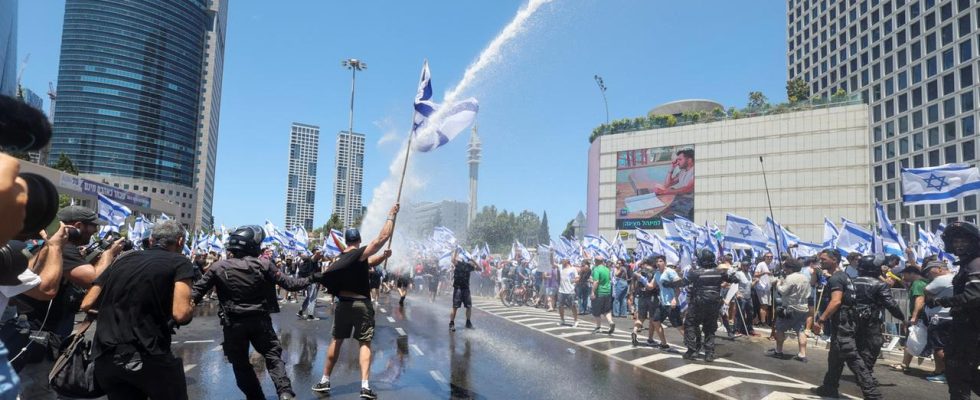In Israel, the dispute over the controversial judicial reform is coming to a head: demonstrators have blocked important roads and there have already been numerous arrests. The nationwide protest is expected to last all day.
During nationwide protests against the Israeli government’s judicial reform, there have been clashes between demonstrators and police officers in various places in Israel. According to the police, so far more than 40 demonstrators have been arrested for disturbing public order in various places.
According to a report in the Haaretz newspaper, two press photographers were also arrested. Police said they will protect the right to freedom of expression and protest within the limits of the law, but will not accept violations of public order, disruption of traffic or endangering motorists.
Blocked highways and water cannons
After Israel’s parliament approved part of the highly controversial judicial reform in the first reading on Monday evening, mass demonstrations were called for. Already in the morning, activists temporarily blocked highways to Jerusalem, Haifa and Tel Aviv as well as other important roads.
The demonstrators waved Israeli flags and beacons, some lay down on the street. Police used a water cannon to evict protesters from an expressway into Jerusalem. Officials also prevented protesters from marching from the Supreme Court to the Parliament building in Jerusalem. In Haifa, the protests brought traffic along the seafront to a standstill. In Tel Aviv, according to Haaretz, two demonstrators were injured in clashes with mounted police officers.
Protests announced at the airport
300 reservists from the military’s cyber unit also demonstrated: they signed a letter saying they would not volunteer for duty as a protest. “Sensitive cyber skills that could be used for evil must not be passed on to a criminal government that undermines the foundations of democracy,” it said.
The organizers of the protests in the country, which have been going on for months, announced a “Day of Disruption” last week in response to the approval of the draft. In addition to the planned blockades at intersections and several central streets, motorists were asked to drive particularly slowly “to set an example,” said a spokesman. Later, rallies are to take place in numerous places, including at Ben Gurion International Airport near Tel Aviv.
On “Day of Disruption” people protest against Israeli Prime Minister Benjamin Netanyahu and his judicial reforms in Tel Aviv and other cities.
Criticism from the government – encouragement from the opposition
Israel’s Minister of Education, Joav Kish, described the demonstrations as an attempt to “intimidate elected officials and disrupt the lives of millions of people,” the Times of Israel newspaper reported. “This terror” will not be given in to.
The chairman of the “National Unity” party, Benny Gantz, had called on the police in the morning “not to give in to the government’s threatening campaign” and to allow the protests. He called on the demonstrators on Twitter to protest “in accordance with the law and the instructions of the police”.
Plans divide Israel
The reform plans have deeply divided Israel’s society. The draft, which has now been approved for the time being, stipulates that the Supreme Court will no longer be able to examine the “appropriateness” of decisions made by representatives of the people.
For example, earlier this year the court ruled that the appointment of the leader of the Schas party, Arie Deri, as interior minister was inappropriate because he had been convicted of corruption, among other things.
Critics see the judicial reform pushed by Prime Minister Benjamin Netanyahu as an attempt to undermine the democratic separation of powers. By removing the Supreme Court’s powers of scrutiny, the government could make arbitrary decisions, make inappropriate appointments or dismissals and open the door to corruption, opponents say.
The government, on the other hand, argues that elected representatives of the people must be strengthened against an encroaching judiciary.

